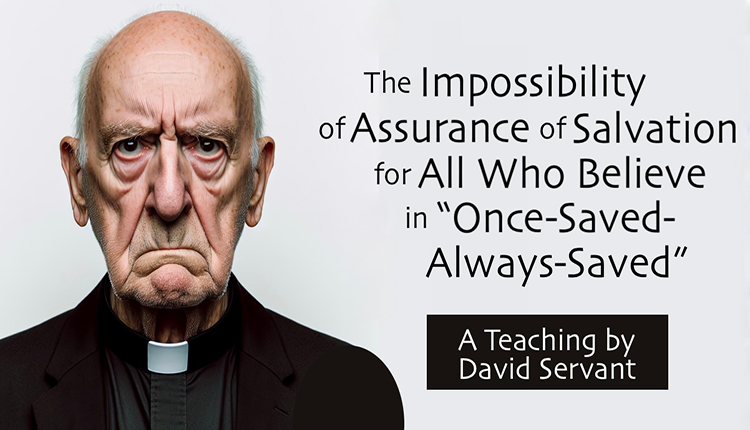
The popular doctrine of “once-saved-always-saved” or “unconditional eternal security,” advocates that those who genuinely believe in Jesus at any point in their life are guaranteed to live forever in God’s eternal kingdom. There is no possibility, advocates claim, of anyone forfeiting salvation once it is gained.
There is at least one ancillary doctrine that generally must be embraced by those who advocate “unconditional eternal security.” They must, of necessity, also believe that those who at one time appeared to be fruitful believers but who “backslid” and become Christ-deniers must have never actually believed in the first place. Such people must have possessed a false faith all along, because if you are “once-saved,” you will be “always-saved.”
The only alternative to that ancillary doctrine is to believe that it is possible to have faith in the Lord Jesus Christ without any outward evidence or fruit. That idea, however, mocks any understanding of the nature of faith, not to mention all the scriptures, such as James 2:14-20, which indicate that faith without works is dead, useless and cannot save. It is a view that is so logically absurd and outrageously unbiblical that it is held by only a small fraction of professing Christians.
One among that small fraction was an internationally-known pastor (now deceased) who claimed that “salvation is like a tattoo…once you have it, you can never lose it, even if you later regret getting it.” That same pastor claimed that “if you ever once believed in Jesus for ten seconds, and then abandoned all faith for the rest of your life and became an atheist, you are eternally secure and are guaranteed heaven.” His premise was based on Mark 16:16: “He who has believed and has been baptized shall be saved.” “See,” he said, “Mark wrote that he who ‘has believed’—that is past tense—’shall be saved’—that is future tense. So, anyone who has ever believed in Jesus in any time in the past is eternally secure.”
I wonder why he didn’t apply the same pathetic logic to the next part of that same sentence from Jesus’ lips, in which He said, “but he who has disbelieved shall be condemned” (Mark 16:16b). If believing for ten seconds at any time in the past guarantees heaven, then disbelieving for ten seconds at any time in the past must guarantee hell. That pastor would have been better to have based his theology on every relevant New Testament passage, rather than on one into which he forced his bias.
In any case, most who ascribe to “once-saved-always-saved” and thus also “not-saved-never-saved” do not hold to “no-fruit-no-worries.”
If adherents of “once-saved-always-saved / not-saved-never-saved” thought about it, they would have to admit that their belief eliminates any and all assurance of salvation, because no one can know if their faith is genuine until the moment of their death. Then, and only then, can they be certain their faith was not false, because they believe that all people who backslide were never saved in the first place, and until their death, they don’t know if they themselves might backslide. All they can do is hope they won’t backslide, which would tragically prove their faith to be bogus.
Let there be no mistake about this, because it is irrefutable. Those who subscribe to “once-saved-always-saved,” and who also believe that faith results in some fruit, can have no assurance of future or present salvation. Again, their faith could prove to be bogus before they die, which will “prove” they never really believed in the first place.
Calvinists have the identical problem since they hold to a similar doctrine which they refer to as “perseverance of the saints.” That is, those whom God selected in eternity past and sovereignly saved by granting them faith will continue to believe, and thus they will continue to bear fruit because “salvation is a sovereign work of God.” So, if they ever backslide, it “proves” they were never saved and that their faith was bogus. So, no Calvinist can possess assurance of either future or present salvation, because no Calvinist knows if his faith is genuine or bogus, and he won’t know until his death, at which time he hopefully will still be believing. All he can do is hope he won’t backslide, which would tragically prove his faith to be bogus.
This, too, is irrefutable.
Those who believe all the relevant New Testament passages, however, can grow every day in assurance of their salvation. As they cooperate with the indwelling Holy Spirit and manifest His fruit, they know God is at work within them, and it can’t be bogus. That, in fact, is one of the major themes of 1 John.
Food for thought.

